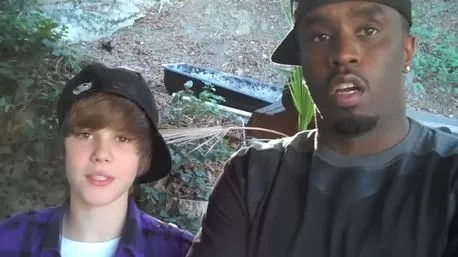Is The Justin Bieber Song About Diddy Real? Let’s uncover the reality behind the viral track and how payoffsong.com can help you explore legitimate opportunities for music licensing and revenue generation. Understanding song ownership and exploring avenues for royalties and synchronization rights can lead to music success.
Table of Contents
1. Understanding the Viral Song Controversy
2. The AI Deception: How Technology Creates Fake Songs
3. Examining the Alleged Lyrics: “Lost Myself at a Diddy Party”
4. Expert Analysis: AI Detection Tools and Their Findings
5. Justin Bieber and Diddy’s Relationship: A Timeline
6. Legal Troubles and Allegations Against Diddy
7. The Impact of AI on the Music Industry
8. Opportunities for Musicians: Licensing and Royalties
9. Protecting Your Music: Copyright and Legal Considerations
10. Frequently Asked Questions (FAQs)
1. Understanding the Viral Song Controversy
The truth is the Justin Bieber song about Diddy isn’t real; it’s likely an AI-generated fabrication. The viral song, which surfaced on social media, features lyrics about Bieber supposedly “losing myself at a Diddy party.” However, there is no official record of Justin Bieber ever releasing such a track. The buzz around the song intensified amidst serious allegations against Sean ‘P Diddy’ Combs, including charges of sex trafficking, racketeering conspiracy, and prostitution, all of which he denies. The timing and controversial nature of the claims fueled speculation, leading many to believe the song was authentic. It’s crucial to distinguish between genuine music releases and AI-generated content, especially given the increasing sophistication of AI technology. To navigate the complexities of music rights and licensing, platforms like payoffsong.com offer invaluable resources and guidance. Understanding these nuances can help artists and industry professionals make informed decisions in an evolving landscape.
2. The AI Deception: How Technology Creates Fake Songs
AI-generated music is transforming how songs are made and consumed, but it also creates significant challenges regarding authenticity and copyright. Artificial intelligence can mimic the voices and styles of popular artists, making it increasingly difficult to distinguish between real and fake tracks. This technology analyzes existing songs to replicate an artist’s vocal patterns, melodies, and overall sound, potentially leading to convincing yet entirely fabricated songs. AI audio detection tools are becoming crucial in verifying the legitimacy of music. Tools like those used by CBS News can identify AI-generated components within a track, helping to debunk fake songs. Stephen Stahl, co-founder of Ai-SPY, suggests that someone likely wrote the lyrics and melody of the purported Bieber song and then used AI to clone Bieber’s voice. For musicians, understanding these technological advancements and how to protect their work is vital; resources available at payoffsong.com can provide insights into copyright protection and licensing.
3. Examining the Alleged Lyrics: “Lost Myself at a Diddy Party”
The lyrics of the viral song, “Lost myself at a Diddy party, didn’t know that’s how it go, I was in it for a new Ferrari, but it cost me way more than my soul, wasn’t worth all the fortune and fame,” paint a narrative of regret and disillusionment. These lyrics suggest a dark side to fame and the potential pitfalls of associating with controversial figures. However, fact-checking sites like Snopes have found no concrete evidence to support the song’s authenticity. The absence of any official release or confirmation from Justin Bieber’s representatives further casts doubt on its legitimacy. This situation highlights the importance of verifying information before sharing it, especially in the age of social media where misinformation can spread rapidly. For songwriters and artists, creating authentic and meaningful work remains paramount, and platforms like payoffsong.com can assist in understanding the ethical considerations of AI in music.
4. Expert Analysis: AI Detection Tools and Their Findings
Expert analysis using AI detection tools has largely debunked the Justin Bieber-Diddy song as AI-generated. CBS News ran the track through multiple AI audio detection programs, and the findings suggest that parts, if not all, of the song are likely artificial. Stephen Stahl from Ai-SPY believes that the lyrics and melody were written by someone who then used an AI website to clone Bieber’s voice. Zohaib Ahmed, CEO of Resemble AI, also supports the likelihood of AI generation. According to research from the National Music Publishers’ Association (NMPA), in July 2025, AI will be able to generate 90% of songs on streaming platforms. This highlights the increasing sophistication and prevalence of AI in music creation. These findings emphasize the need for vigilance and critical evaluation of online content. For those in the music industry, understanding how to leverage AI responsibly while protecting their intellectual property is crucial, and resources like payoffsong.com can provide valuable guidance.
 Artificial Intelligence Music
Artificial Intelligence Music
5. Justin Bieber and Diddy’s Relationship: A Timeline
Justin Bieber and Diddy’s relationship began early in Bieber’s career when he signed with Usher’s record label at the age of 15. Diddy, who had a close relationship with Usher, took Bieber under his wing, as seen in footage from 2009 showing them spending time together. Diddy mentioned having “legal guardianship” of Usher during his early career and jokingly claimed temporary “custody” of Bieber for 48 hours, promising a wild experience. However, this association has come under scrutiny given the recent allegations against Diddy. A source close to Bieber, who recently became a father, told People that he is focused on his family and wants to distance himself from the controversy. Understanding the dynamics of relationships in the music industry and the potential impacts of controversies is important for artists and industry professionals. Resources available at payoffsong.com can offer insights into navigating these complexities.
6. Legal Troubles and Allegations Against Diddy
Sean ‘P Diddy’ Combs is currently facing serious legal troubles, including charges of sex trafficking, racketeering conspiracy, and transportation and engaging in prostitution. These allegations emerged after federal authorities raided his homes in Los Angeles and Miami. Over the past year, several individuals have sued Combs, accusing him of physical and sexual abuse. One of the most notable cases involves his ex-girlfriend, R&B singer Cassie, who accused Combs of rape and a decade-long pattern of abuse that began when she was 19. While Combs has denied these allegations and pleaded not guilty to the federal charges, the accusations have significantly impacted his reputation and career. The grand jury indictment documents detail allegations dating back to 2008, accusing him of abusing, coercing, and threatening women for years. These legal challenges underscore the importance of ethical conduct and accountability in the music industry.
7. The Impact of AI on the Music Industry
AI is revolutionizing the music industry, offering both opportunities and challenges. On the one hand, AI tools can assist musicians in composing, producing, and marketing their music, making the creative process more efficient and accessible. AI can also generate personalized music recommendations for listeners, enhancing their overall experience. However, the rise of AI also raises concerns about copyright infringement, the devaluation of human creativity, and the potential for misuse, as seen with the fake Justin Bieber song. As Stephen Stahl noted, AI can enable anyone to create a song, potentially diminishing the value of talent and originality. Navigating this new landscape requires a balanced approach, leveraging AI’s capabilities while safeguarding artists’ rights and promoting ethical practices. For comprehensive guidance on these issues, payoffsong.com offers resources and insights for musicians and industry professionals.
8. Opportunities for Musicians: Licensing and Royalties
Despite the challenges posed by AI, numerous opportunities exist for musicians to generate income through licensing and royalties. Music licensing involves granting permission for the use of copyrighted music in various contexts, such as film, television, advertising, and video games. Royalties are payments made to copyright holders for the ongoing use of their music. There are several types of royalties, including performance royalties, mechanical royalties, and synchronization royalties. Performance royalties are collected by Performing Rights Organizations (PROs) like ASCAP, BMI, and SESAC when music is publicly performed. Mechanical royalties are generated when music is reproduced, such as through physical copies or digital downloads. Synchronization royalties are paid when music is used in visual media, such as films or commercials. Exploring these avenues can provide a sustainable income stream for musicians, and platforms like payoffsong.com offer resources and support to help navigate the licensing and royalty landscape.
9. Protecting Your Music: Copyright and Legal Considerations
Protecting your music through copyright is essential for safeguarding your creative work and ensuring you receive proper compensation for its use. Copyright law grants creators exclusive rights to their original works, including the right to reproduce, distribute, and display their music. To obtain copyright protection, you must register your music with the U.S. Copyright Office. This process involves submitting an application, a copy of your work, and the required fee. Copyright infringement occurs when someone uses your music without permission, and it can result in legal action. To avoid infringement, it’s important to obtain the necessary licenses and permissions before using copyrighted material. Understanding copyright law and its implications is crucial for musicians and industry professionals. Payoffsong.com provides valuable resources and guidance on copyright protection and legal considerations.
10. Frequently Asked Questions (FAQs)
Here are some frequently asked questions related to the Justin Bieber-Diddy song and the broader issues of AI in music and music licensing:
| Question | Answer |
|---|---|
| Is the Justin Bieber song about Diddy real? | No, it is widely believed to be an AI-generated song. |
| What are the legal issues Diddy is facing? | Diddy faces accusations of sex trafficking, racketeering conspiracy, and sexual assault. |
| How can AI create fake songs? | AI analyzes existing songs to replicate an artist’s vocal patterns, melodies, and overall sound. |
| What is music licensing? | Music licensing is granting permission for the use of copyrighted music in various contexts, such as film, television, and advertising. |
| How do I protect my music with copyright? | Register your music with the U.S. Copyright Office by submitting an application, a copy of your work, and the required fee. |
| What are performance royalties? | Performance royalties are collected by PROs like ASCAP, BMI, and SESAC when music is publicly performed. |
| What are mechanical royalties? | Mechanical royalties are generated when music is reproduced, such as through physical copies or digital downloads. |
| What are synchronization royalties? | Synchronization royalties are paid when music is used in visual media, such as films or commercials. |
| What should I do if someone infringes on my copyright? | Consult with an attorney to discuss your legal options and potential remedies. |
| How can payoffsong.com help musicians? | payoffsong.com provides resources and guidance on music licensing, copyright protection, and navigating the evolving music industry landscape, helping musicians protect their work and find new opportunities. |
For more information and to explore your options, visit payoffsong.com today. Unlock the potential of your music and navigate the industry with confidence.

